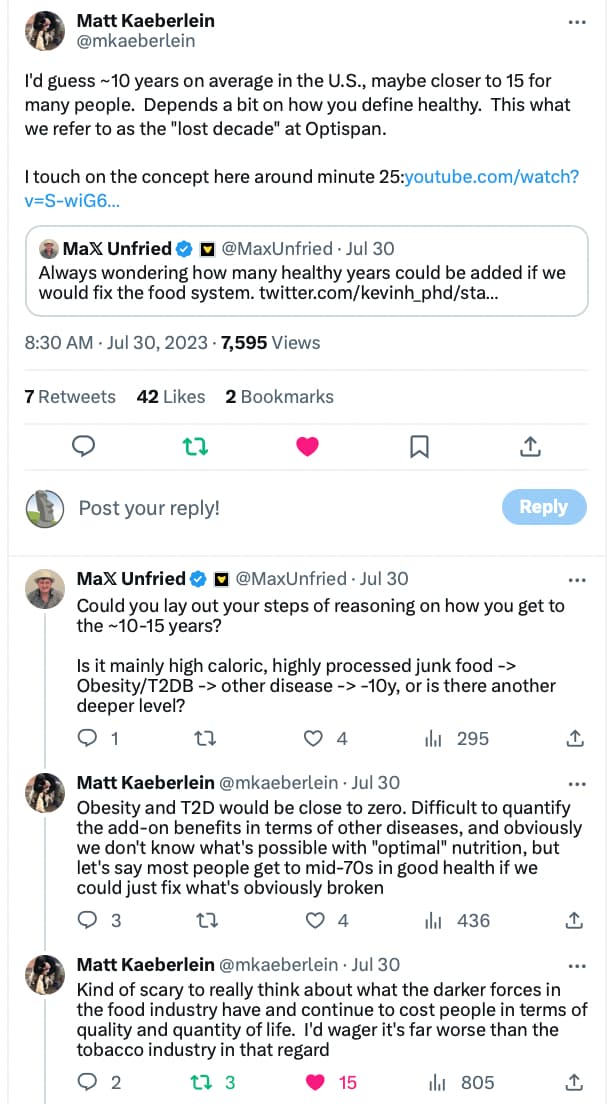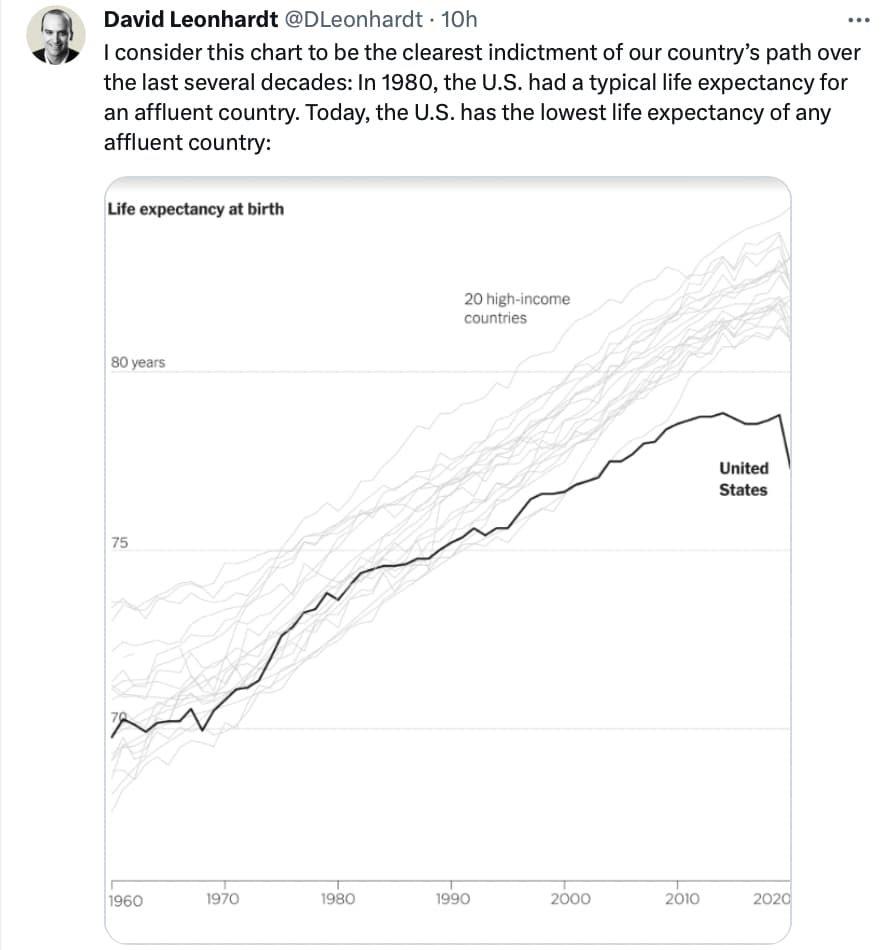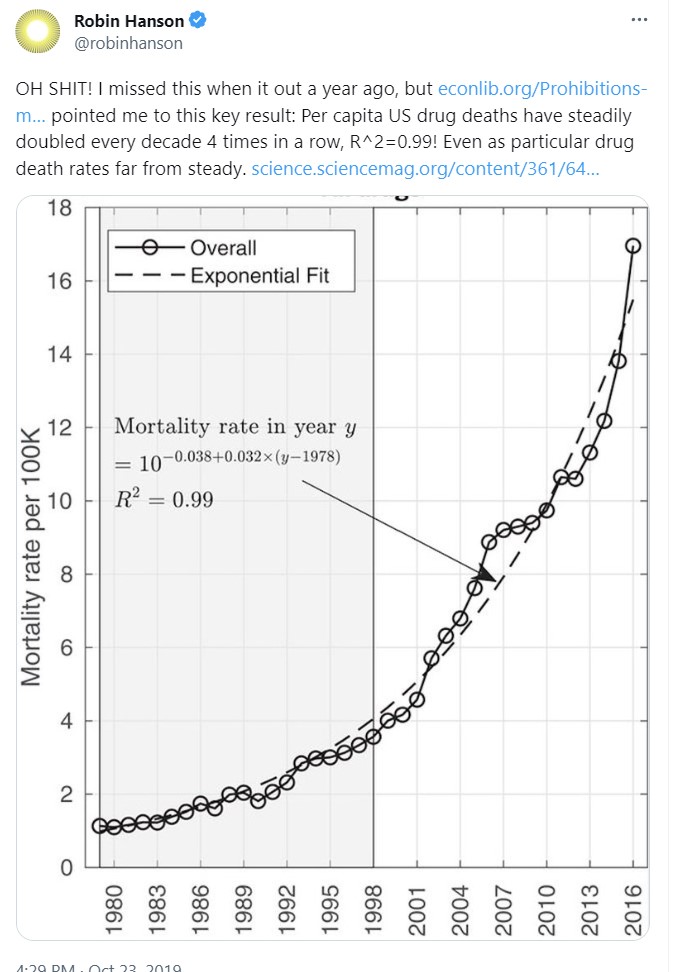You are probably spot on here.
Yes, mostly diet.
But a new study just came out suggesting cold temperature is not a bad thing when it comes to longevity - so keep doing those cold plunges and polar bear swims! :
Cold temperature extends longevity and prevents disease-related protein aggregation through PA28γ-induced proteasomes
Aging is a primary risk factor for neurodegenerative disorders that involve protein aggregation. Because lowering body temperature is one of the most effective mechanisms to extend longevity in both poikilotherms and homeotherms, a better understanding of cold-induced changes can lead to converging modifiers of pathological protein aggregation. Here, we find that cold temperature (15 °C) selectively induces the trypsin-like activity of the proteasome in Caenorhabditis elegans through PSME-3, the worm orthologue of human PA28γ/PSME3. This proteasome activator is required for cold-induced longevity and ameliorates age-related deficits in protein degradation. Moreover, cold-induced PA28γ/PSME-3 diminishes protein aggregation in C. elegans models of age-related diseases such as Huntington’s and amyotrophic lateral sclerosis. Notably, exposure of human cells to moderate cold temperature (36 °C) also activates trypsin-like activity through PA28γ/PSME3, reducing disease-related protein aggregation and neurodegeneration. Together, our findings reveal a beneficial role of cold temperature that crosses evolutionary boundaries with potential implications for multi-disease prevention.
Bit of a misconception over what we eat here (John Hemming and his full English to one side!)
Also, we don’t walk around carrying guns - possibly causes quite a big difference.
In the 1950s, U.S. life expectancy ranked 12th highest in the world.
By 1968, the U.S. had fallen to 29th.
Today we are ranked 51, behind Cuba, Chile, Costa Rica, Lebanon, Thailand, and many others.
The study, published Thursday in the American Journal of Public Health, also shows more than 50 countries have surpassed the U.S. in life expectancy since the 1930s, and a handful of states may be partly responsible.
“The scale of the problem is bigger than we ever thought … older than we thought, (and) the number of countries outperforming the United States is much larger than we thought,” said study author Dr. Steven Woolf, director emeritus of the Center on Society and health at Virginia Commonwealth University in Richmond.
But the general takeaway remains the same, said Michal Engelman, associate professor of sociology at the University of Wisconsin-Madison. The timeline shows how life expectancy may be heavily influenced by systemic factors that are larger than individual health choices.
Full study paper:
Falling Behind: The Growing Gap in Life Expectancy Between the United States and Other Countries, 1933–2021
Conclusions. The US life expectancy disadvantage began in the 1950s and has steadily worsened over the past 4 decades. Dozens of globally diverse countries have outperformed the United States. Causal factors appear to have been concentrated in the Midwest and South.
Paywalled journal article:
https://ajph.aphapublications.org/doi/abs/10.2105/AJPH.2023.307310
" A ‘blueprint’ for longevity: New study has an answer for why some people live to be over 100"
Same author;
Published: April 3, 2023 updated April 4, 2023
I know that “internally” lowering body temp (eg via fasting, CR or lowering of inflammation , etc) is correlated with longevity in different studies.
And there is all the cold plunge, cryo therapy stuff.
Wonder if small deltas in long term environmental temp (eg what temp AC/heater is set at, the new cooling beds) can have direct longevity benefits (besides via potentially better sleep)?
Any thoughts?
I’ve not seen any data on this issue, so don’t have an opinion. Not sure it would be worth it though… I tried CR for about 6 months and was always cold, wearing a sweater in summer in California… not a life I would find enjoyable longer term. Though - that said, there are situations where I do find lower temp beneficial - like in bed. I’m a warm sleeper - so the bed-cooling technology is of interest to me, and I have enjoyed the Chilipad (though its louder than I would like) and Ooler type products. So that might be a way to benefit, and enjoy it, if it is actually beneficial; https://sleep.me/product/ooler-sleep-system
This new company is focused on a drug that lowers your body temperature for longevity effects… Biophysical Therapeutics: A New Longevity Biotech Platform Company Plays it cool with a Pipeline of Experimentally-validated New Drugs
It’s true! Though I’ve heard this said by a few different scientists now that what you eat has a much smaller effect than how much you eat. As many vitamins and nutrients vegetables might have, the best thing about them might be that it’s really hard to run a caloric surplus just eating vegetables.
This chart looks at life expectancy after the age of 60. The USA comes in 37th place which is a much better number than life expectancy at birth. I find this chart to be more useful as it removes all of the deaths that occur under the age of 60 (most suicides, overdoses, homicides, etc…)
Hong Kong, Japan, Korea and Australia are the place to be for longevity!
I’d say it then puts US life expectancy at the mercy of lack of exercise and a horrible diet.
73… Sadly, it makes sense considering the obesity epidemic. I am not surprised.
According to the WHO (2019 numbers, pre-pandemic):
US Life Expectancy at birth:
Male: 76.28 years
Female: 80.73 years
US Life Expectancy if you make it to 60:
Male: 81.78 years
Female: 84.38 years
The gap between the sexes closes a bit as we age.
Japan Life Expectancy at birth:
Male: 81.49 years
Female: 86.94 years
Japan Life Expectancy if you make it to 60:
Male: 83.95 years
Female: 88.56 years
So, let’s do a comparison:
Difference between Japan and US life expectancy at birth:
Male: 81.49 - 76.28 = 5.21 years
Female: 86.94 - 80.73 = 6.21 years
Difference between Japan and US life expectancy if you make it to 60:
Male: 83.95 - 81.78 = 2.17 years
Female: 88.56 - 84.38 = 4.18 years
I think the figures above show that the life expectancy gained by living in a different country does not make as big of a difference if you can make it to 60. While country-specific factors such as diet, etc… only contribute 2-4 years of extra lifespan.
What this implies is that Americans have a higher incidence of early death. Is it suicide? Drug overdosing? Obesity? Risky behavior? Car accidents? Homicides? Probably all of the above and more…
Others will know the math better than I do, but I wonder if you are overweighting your sample in big/biased way vs your goal when you take out anyone under 60.
A lot of people die of disease (heart attacks, strokes, cancers and organ impairment) before 60. It’s not just violence, car accidents and drug overdoses that occur especially in the 50s.
Said differently, you have added more weight to the blue area in the maps anice and less weight to the red areas by doing the 60 years old cut off. So the analysis approach itself could be meaningfully biasing what your are seeking to answer.
You can also reference this:
About 86% of Men will make it to 60 in the USA. While 94% of Japanese men will.
I believe that the WHO picked 60 as the cutoff age when health starts going into a tailspin for some people. For example:
The average age of people at the time of their first heart attack is 65.5 years for males and 72 years for females. Having a heart attack is less likely in younger people, and the risk increases as a person ages.
Hi @DeStrider - not sure if I understand. That seems to mean that quite a few get heart attacks that kill before their 60th birthday and is hence an example of how I think the analysis in the prior post is not correctly helping to answer the question you were asking the data.
My guess is that a very high ratio of the part of the 14% that are not driven by trauma are in the areas in the US that are least healthy.
So when you take those out, it has biases the analysis to seems as if different between “healthy US” and “unhealthy us” is smaller, or rather than the country overall is healthier when it is not.
In the past 20 years, on economic measures, America has outperformed other rich countries. Over that period, median wages grew by 25%, compared with just 17% in Germany. Managers at Buc-ee’s, a Texas-based chain of stores, can make more than experienced doctors earn in Britain. But on a more fundamental measure of wellness—how long people live—America is falling behind. To its detractors, this is a cause for schadenfreude. “Many people say it is easier to buy a gun than baby formula in the us,” gloated a statement released by the Chinese Ministry of Foreign Affairs last year, which also pointed to declining life expectancy in general. In the past few years, according to some estimates, life expectancy in China overtook that in America. For Americans, that ought to be a more serious source of introspection than it is.
Full Article: https://archive.ph/31aZA#selection-955.0-959.331
Commentary (independent of this story):


